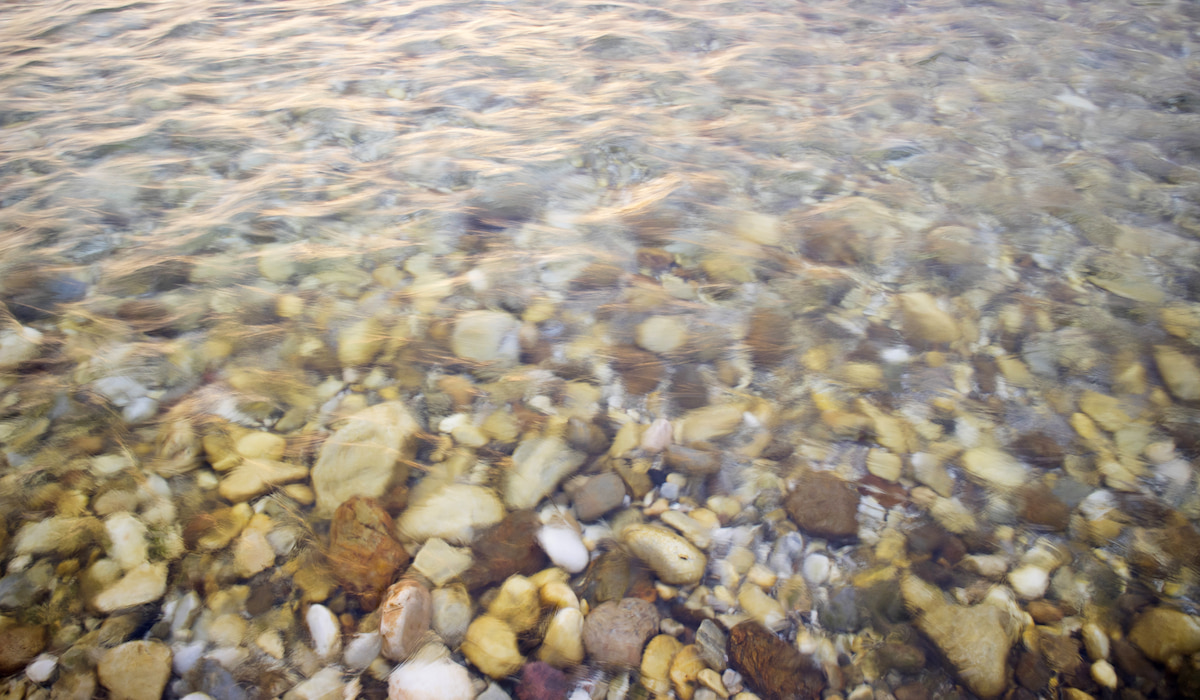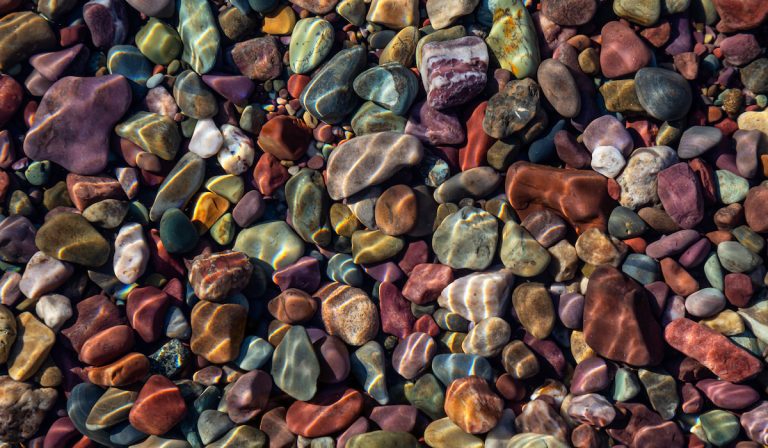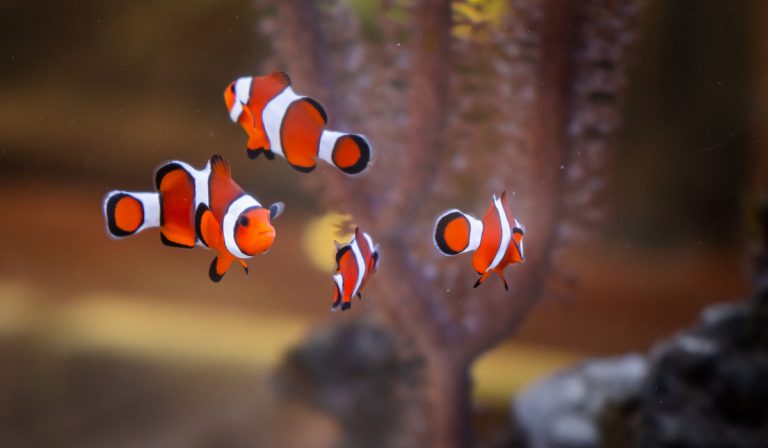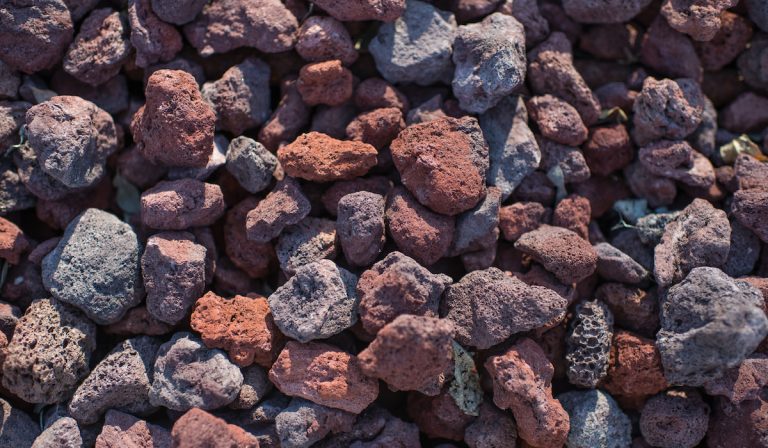Are River Rocks Safe for Aquariums? (All You Need to Know!)
Aquariums are beautiful and can boost the appearance of your home. One awesome way to make your aquarium look more beautiful is by adding rocks.
While there are many types of rocks to add to your aquarium, people often suggest using river rocks.
Are river rocks safe for aquariums?
River rocks are safe for aquariums, but you should be very careful when using river rocks in your aquarium because of various reasons.
River rocks can bring algae and other unwanted organisms into the aquarium, but the cons of using river rocks in aquariums are easy to prevent.
How do you prepare river rocks for aquariums? Can you use every type of river rock in your aquarium? Continue reading.
Are River Rocks Safe for Aquariums?
Different people have different answers to that question. For many, river rocks are very safe. River rocks are the safest rocks to use in aquariums as they are already from a water body and can be prepared easily before placing them in the aquarium.
There are many benefits of using river rocks in aquariums. Remember, however, that there are some qualities of river rocks you should be mindful of for the safety of your fish.
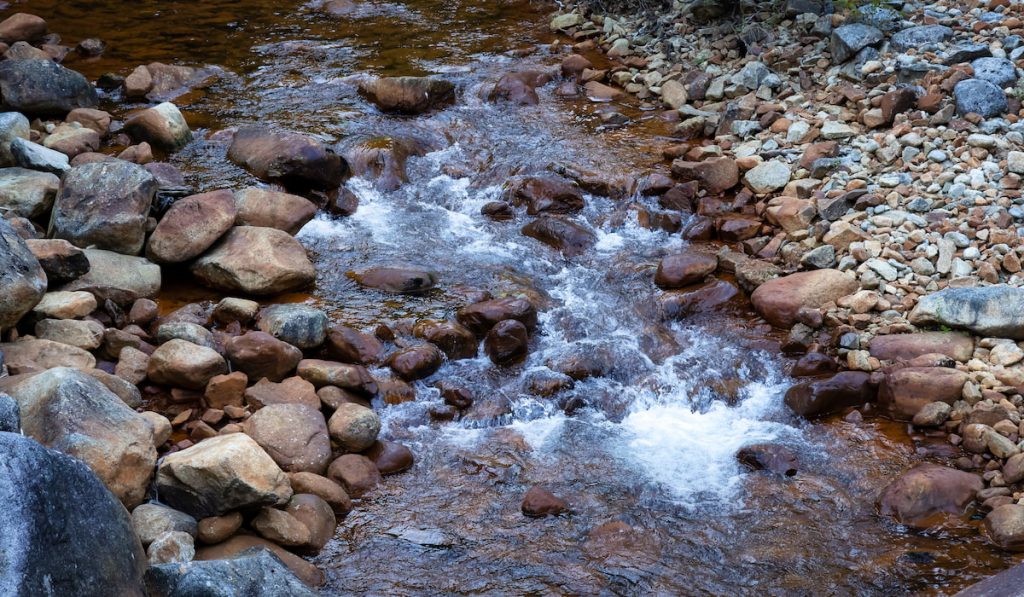
Benefits of River Rocks in Aquariums
Here are some reasons you should use river rocks in your aquarium.
1. Aesthetics
River rocks give your aquarium a more nature-like appearance. These rocks complement the look of your aquarium as they are already from a water body.
With proper aquarium lighting, the river rocks can make your home look like a house close to a river. Make sure to place the rocks in positions (and according to their color) so that the aquarium will look well-arranged.
2. Fish in the Tank Will Be More Comfortable
There’s a thing between fish and rocks. Fish are more comfortable in aquariums with rocks. They love the appearance, feeling, and feel at home.
It is also a great idea to introduce rocks from rivers where your aquarium fish are indigenous, if possible. These rocks can help keep your fish from feeling stressed or as if they are in captivity.
River rocks can also be breeding spots for some aquarium fish. If your aquarium fish see rocks that are common in their habitats, they may happily breed in the tank. Also, rocks make good resting spots for your aquarium fish.
3. No Drastic Change in Water pH
One reason people frown upon placing river rocks in aquariums is due to the alteration of water pH. River rocks will not drastically alter the aquarium water pH.
In fast-flowing rivers, rocks are easily crushed and eroded and this makes them release calcium carbonate and other compounds that can increase water pH.
In aquariums, the water is considerably still, so the rocks are less abraded. Also, river rocks do not alter water pH as quickly as rocks collected from quarries and other terrestrial sites.
Now you know a few benefits of using river rocks in your aquarium. What should you watch out for?
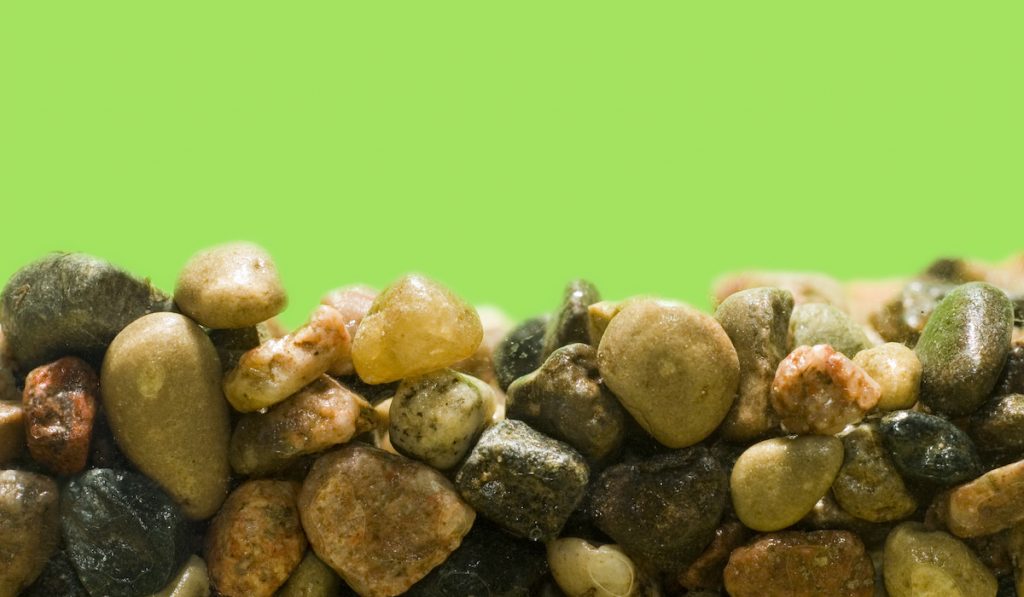
How River Rocks Affect Your Aquarium Fish and Water Quality
Some ways river rocks affect your aquarium are described below:
1. Introduction of Algae
Every river rock is a potential home to tons of microbes including algae. If you introduce river rocks into your aquarium without properly washing them, you may notice that your aquarium water goes green quickly. This is due to the algae present on the rocks.
2. Buildup of Bacteria
There are different types of bacteria present in river rocks and the way they affect your aquarium depends on several factors. For example, the amount of dissolved oxygen in your aquarium water determines the microbes that will grow in the aquarium.
If your aquarium is well-oxygenated, decomposing bacteria will increase in population and they can be beneficial as they help to break down your fish waste into non-toxic forms.
If, however, the aquarium is not properly aerated, anaerobic bacteria will grow and they can harm your fish by producing methane and depleting the oxygen even more.
River rocks are good substrates for bacteria, so you need to be careful when introducing them into your aquarium.
3. Shelter for Parasites
If you do not properly wash the river rocks, some parasites such as leeches and nematodes will find their way to your aquarium fish. Fish are not the only creatures that love rocks, are they?
4. Rocks Can Crumble
Even though they do not crumble quickly, river rocks can eventually crumble and when they do, they can drastically alter the water pH and other chemical qualities. The drastic change in water quality can shock or stress your fish.
5. Color of the Rocks
River rocks have limited colors and they may not be exactly what you need in your aquarium. In this case, you will have to consider other types of rocks.
Now you know what to consider before placing river rocks in your aquarium. How do you prepare river rocks to be used in aquariums? Continue reading.

How to Prepare River Rocks for Use in Aquariums
To avoid problems, make sure you follow the process stated below:
1. Test the Rocks
Take the rocks to a rock expert, geologist, aquarium shop, or anyone who can help you examine the rocks if they are safe for your aquarium. Consider the source of the rocks and also the types of fish in the aquarium.
2. Wash the Rocks
You should wash the river rocks in hot water or bleach (bleach is preferable). This helps to kill every organism present on the rocks. Washing your river rocks is a very important step in the preparation.
3. Dry the Rocks
After washing the rocks, you should keep them on a surface that receives sunlight, but not wind. Sunlight will dry the rocks. You can also dry the rocks in an oven. Keep the rocks dry for more than two days as many aquatic organisms (microbes) cannot survive in dry spots after two days (after using bleach to wash the rocks).
4. Soak the Rocks
When the rocks are dry, soak them for 4-7 days in clean water. In this period, carefully examine the water for any changes. For example, is the water becoming green? Are insects emerging from the rocks?
Whatever happens in this period will determine if you should restart the rock preparation process from step 2 or move on to step 5.
5. Rinse the Rocks with Clean Water
If you are satisfied with the changes that occurred when you soaked the river rocks in water for 4-7 days, you should rinse the rocks with warm water before placing them in the aquarium.
Now you have fully prepared the river rocks to be used in your aquarium. It is time to place the rocks in your aquarium.
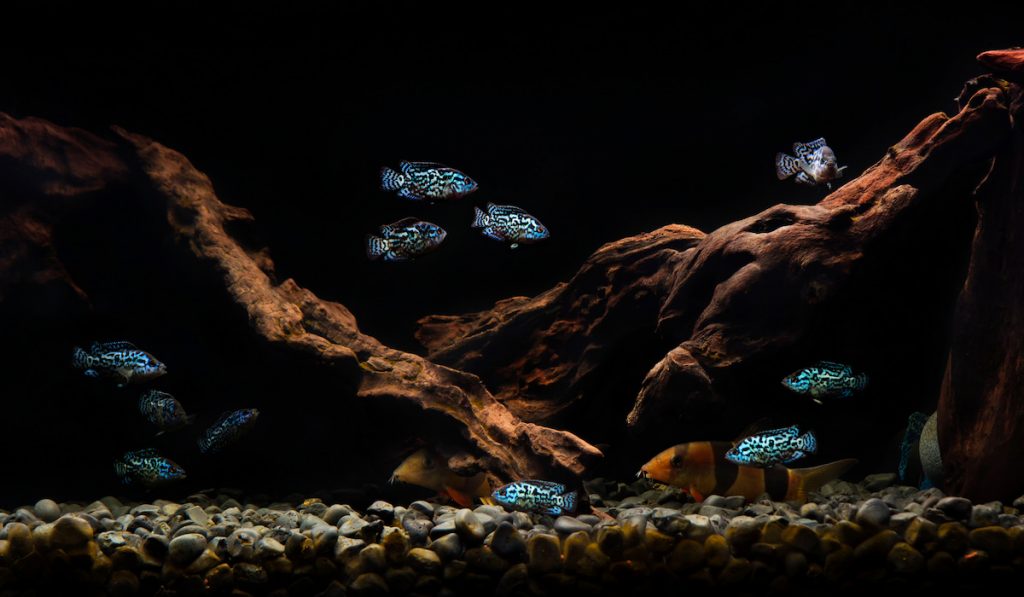
Introducing River Rocks into the Aquarium
Here are the easy steps to follow:
- Examine the Rocks: Examine the rocks for cracks. Remove any cracked rocks you find.
- Reduce Your Aquarium Water Level: If you already have fish in the aquarium, you should reduce the water level to be as low as possible (but still permit your fish to swim).
- Place Some Rocks in the Aquarium: Just place 10-20% of your rocks in the aquarium.
- Increase the Water Level and Examine Your Aquarium Fish: You should examine your fishes for 4-6 hours if they are comfortable with the rocks. If they are, continue to the next step. If not, remove the rocks.
- Introduce the Remaining Rocks: Introduce the remaining rocks by reducing the water level again. Carefully arrange the rocks according to their colors and sizes.
It would help if you wear sterilized hand gloves during this process and also be as fast as possible.

Related Questions and Answers
Do you have any questions? Here’s the answer:
1. What Kind of Rocks Should You Use or Avoid in Aquariums?
Here are some rocks that you should not use in your aquarium as they can harm your fishes or alter the water quality:
- Shells
- Corals
- Limestone
- Geodes
- Marbles
- Dolomites
Some rocks that you can use in your aquarium are:
- Granite
- Quartz
- Slate
- Lava rocks
- Onyx
Make sure that you test your rocks before adding them.
2. Can You Use River Rocks for Planted Aquariums?
It depends on the types of plants in the aquarium. For example, some plants prefer to be planted in a loose substrate such as river rocks while some don’t want rocks covering the crown of their roots. You should consider the types of plants in the aquarium.
3. Can You Collect Rocks from Any River?
Consider the following before collecting rocks from a river:
- Local Laws: Check local laws and regulations to know if you can collect rocks from a particular river.
- Polluted Rivers: You should not collect rocks from polluted rivers as they can make your fish sick.
- Species of Fish in the Aquarium: It is best to collect rocks from rivers that have similar water quality to the natural habitats of your aquarium fish.
Don’t be hasty in collecting those rocks.
Have you found the answer to your question?
Final Thoughts
River rocks are very beautiful and they are safe to be used in aquariums so long you are careful when preparing them to be used in the aquarium. You should always check the behavior of your aquarium fish and make sure that they accept the rocks.
Resources
- https://inlandaquatics.com/best-freshwater-aquarium-rocks
- https://www.thesprucepets.com/do-rocks-affect-aquarium-water-ph
- https://www.thesprucepets.com/using-outdoor-gravel-or-rocks-in-an-aquarium
- https://www.myaquariumclub.com/has-anyone-use-river-rock-in-there-tanks
- https://aquariumtidings.com/adding-rocks-to-aquarium

